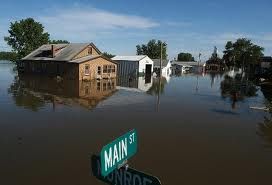Following the weather is beginning to feel like revisiting the Biblical plagues. Tornadoes rip through Missouri, Alabama, Mississippi, Oklahoma — even Massachusetts. A million acres burn in Texas wildfires. The Army Corps of Engineers floods 135,000 acres of farmland and three million acres of bayou country to save Memphis and New Orleans. Earlier in the past year, a 2,000-mile storm dumped near-record snow from Texas to Maine, a fifth of Pakistan flooded, fires made Moscow’s air nearly unbreathable, and drought devastated China’s wheat crop. You’d think we’d suspect something’s grievously wrong.
But media coverage rarely connects the unfolding cataclysms with the global climate change that fuels them. We can’t guarantee that any specific disaster is caused by our warming atmosphere. The links are delayed and diffuse. But considered together, the escalating floods, droughts, tornadoes, and hurricanes fit all the predicted models. So do the extreme snowfalls and ice storms, as our heated atmosphere carries more water vapor. So why deem them isolated acts of God — instead of urgent warnings to change our course?

 Severe storms have swept across the Midwest and Southern United States that have killed over 300 people as massive tornadoes swept through the region. It isn’t just tornadoes that are causing the devastation but the heavy rains have caused flooding that is wiping out entire towns as levees along the Mississippi and Missouri Rivers fail.
Severe storms have swept across the Midwest and Southern United States that have killed over 300 people as massive tornadoes swept through the region. It isn’t just tornadoes that are causing the devastation but the heavy rains have caused flooding that is wiping out entire towns as levees along the Mississippi and Missouri Rivers fail.
